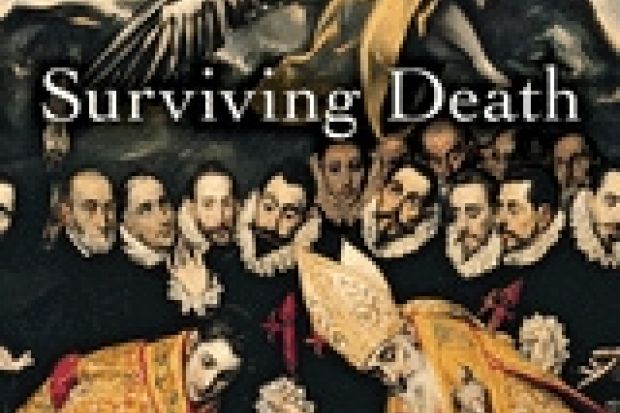Wittgenstein said that with death the world ends, rather than changes. He got that wrong. It carries on. So we can ask, first, will I still be there within it? And second, if I won't be there, does it much matter?
Among the Greeks, the Epicureans were confident that death was the end, not of the world, but of those who die. Yet they insisted that there is nothing to fear or regret in death. Many people today, especially in what Mark Johnston identifies as "godless Europe", will be with them on the first point, but not on the second. Death is the end, but it's bad that we die. Others think we mostly do survive death. If we didn't, there'd be no work for undertakers and pathologists. But surviving death in this way, as a corpse, offers little comfort. And finally, at least some conventionally religious people hold both that we survive and that we hang on to what is important. There's a heaven and there's communication with God and each other, and you can, from some indeterminate distance, watch your grandchildren grow up.
Where is Johnston in all this? In one way he's in with the last group, believing both that we can survive death and that we retain, in survival, the sort of life that does, or at least should, matter to us. But in another way he stands apart: whereas conventional religion is imbued with supernatural elements, Johnston's account is doggedly mundane. There is, or at least there aims to be, nothing in it that will upset the atheist.
There are, as I've already suggested, both metaphysical and moral elements to this. It's mostly around discussions of the former that Johnston's formidable philosophical reputation is built. What sorts of things are we such that post-mortem survival is possible? Johnston argues that we are "protean" - we have it in our power to change the sorts of things we are by changing (although admittedly not overnight) the sorts of things we do, and the ways in which we think about ourselves and others. If this is right, then more familiar views are wrong, and Johnston argues at length that we are neither immortal souls, nor biological organisms, nor contingently embedded psychologies that might resurface in another brain, or a computer, or a doe-eyed avatar.
We can change what we are, and we should, or at least we should try to. Not as a means to surviving death - that's going to be a welcome side effect - but in order to be good. Good people acknowledge the several threats to goodness - from death, disease, disasters, dreadful other people - and hope to do something about it. And if we are good, then we'll be less attached both to the stuff in the world and to the details of our own personalities. The Epicureans can re-enter the picture here. Their idea - like that of some Buddhists - is that we should similarly seek detachment. The less we care, the less death and non-existence will harm us. Johnston's twist on this is to insist that reduced attachment is compatible with our literal survival.
This astonishing book derives from a lecture series, filled out with extra material, addenda and revised versions of question-and-answer sessions. As its author acknowledges, it's a far from easy read. The problems it faces are obvious. Can Johnston really make the case for our literal survival in the lives of others, or, as he puts it, "the onward rush of mankind"? And is he right to insist on the link between the good and the self-effacing? Many of us think that life is to be lived, even if it hurts. And we might be right.
Surviving Death
By Mark Johnston
Princeton University Press
408pp, £24.95
ISBN 9780691130125
Published 24 February 2010
Register to continue
Why register?
- Registration is free and only takes a moment
- Once registered, you can read 3 articles a month
- Sign up for our newsletter
Subscribe
Or subscribe for unlimited access to:
- Unlimited access to news, views, insights & reviews
- Digital editions
- Digital access to THE’s university and college rankings analysis
Already registered or a current subscriber? Login
